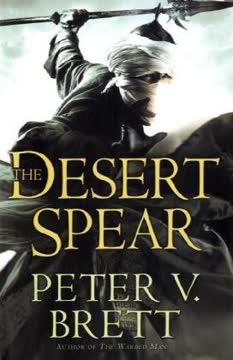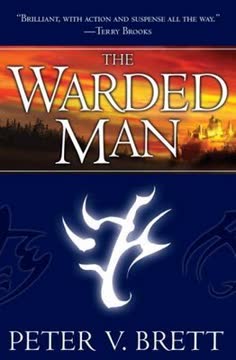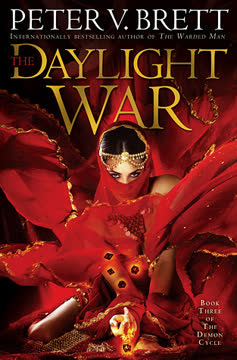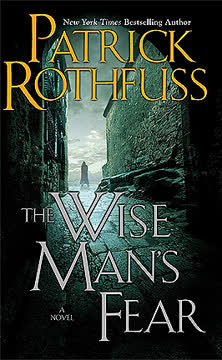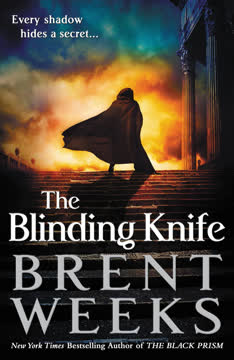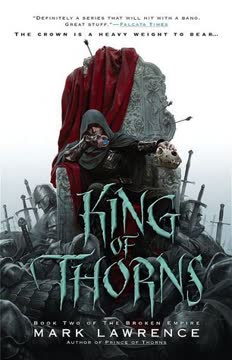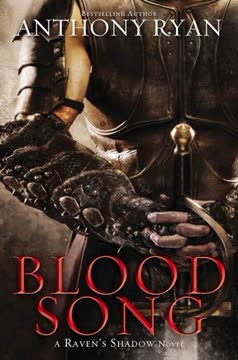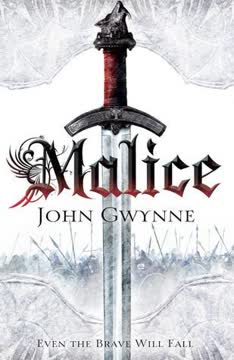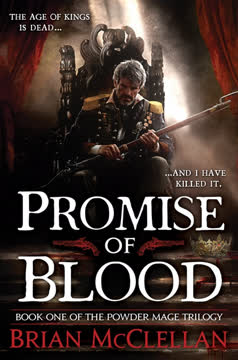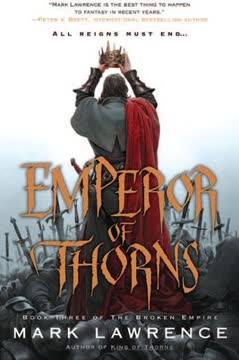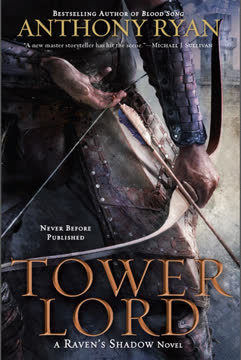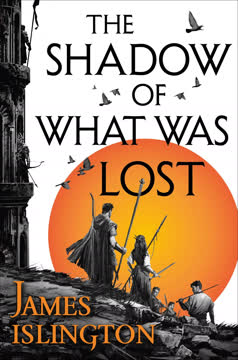Plot Summary
Demons Breach Krasian Defenses
In the heart of Krasia, a formidable rock demon breaches the ancient gates, leading a horde of demons into the Maze. The elite Krasian warriors, the dal'Sharum, are caught off guard, and chaos erupts as they struggle to contain the invasion. Jardir, the Sharum Ka, rallies his men, but the breach threatens to overwhelm them. Amidst the turmoil, a mysterious Northern Messenger, Arlen, arrives, seeking to fight alongside the Krasian warriors. His presence and the demon's unprecedented attack raise questions about the true nature of the threat they face.
Jardir's Rise and Betrayal
Jardir's journey from a young warrior to the Sharum Ka is fraught with challenges and betrayals. His wife, Inevera, a powerful dama'ting, manipulates events to secure his rise to power, even as Jardir grapples with the moral complexities of his ascent. The tension between his ambition and the traditional values of Krasia is palpable, as Jardir navigates the treacherous political landscape. His leadership is tested as he must balance the demands of his role with the personal betrayals that haunt him.
A Northern Messenger Arrives
Arlen, a Northern Messenger, arrives in Krasia, seeking to join the fight against the demons. His presence is met with skepticism and hostility, as the Krasian warriors view him as a cowardly outsider. However, Arlen's determination and knowledge of the demons earn him a place among the dal'Sharum. His arrival coincides with the unprecedented attack on Krasia, suggesting a deeper connection between him and the demonic threat. Jardir must decide whether to trust this enigmatic figure or view him as a potential threat.
The Rock Demon Assault
The rock demon's attack on Krasia is relentless, its immense power threatening to destroy the city. Jardir and his warriors fight valiantly, but the demon's strength is overwhelming. Arlen's knowledge of the demon's weaknesses becomes crucial, as he aids Jardir in devising a plan to trap the creature. The battle tests the limits of Jardir's leadership and the unity of the Krasian warriors, as they face a foe unlike any they have encountered before.
A New Alliance Forms
In the aftermath of the battle, Jardir and Arlen form an uneasy alliance, recognizing the need to unite against the greater threat of the demons. Arlen's presence challenges the traditional Krasian beliefs, as his knowledge and skills prove invaluable in the fight. Jardir must navigate the delicate balance of integrating this outsider into their ranks while maintaining the loyalty of his men. The alliance sets the stage for a broader conflict, as the true scope of the demon threat becomes apparent.
The Deliverer's True Path
As the dust settles, Jardir reflects on his role as the Sharum Ka and the Deliverer Prophecy. Inevera's manipulations and the arrival of Arlen force him to confront the possibility that his destiny is intertwined with the Northern Messenger. The path to becoming the Deliverer is fraught with peril, and Jardir must decide whether to embrace this fate or forge his own path. The chapter ends with a sense of foreboding, as the true nature of the demon threat and the role of the Deliverer remain shrouded in mystery.
Jardir's Command and Control
Jardir, now the Shar'Dama Ka, is focused on unifying the tribes and preparing for the Daylight War. He faces internal challenges, including dissent among the Damaji and the need to integrate the kha'Sharum, former khaffit who have been given a second chance to fight demons. Jardir's leadership is tested as he balances the demands of tradition with the need for innovation. His wife, Inevera, continues to manipulate events behind the scenes, using her prophetic abilities to guide Jardir's actions. The tension between Jardir's ambition and the traditional values of Krasia is palpable, as he navigates the treacherous political landscape.
The Par'chin's Unyielding Spirit
The Par'chin, known as Arlen Bales, continues to fight against the demons with unwavering determination. Despite the challenges he faces, including the internal struggle with his own humanity, Arlen remains committed to his mission. He is haunted by his past and the choices he has made, but he refuses to give up. His relationship with Jardir is complex, marked by betrayal and a shared history. Arlen's presence is a constant reminder of the potential for redemption and the power of the human spirit to overcome adversity.
Renna's Desperate Struggle
Renna Tanner, trapped in a life of abuse and oppression, struggles to find a way out. Her father, Harl, is a tyrant who controls her every move, and Renna is desperate to escape his grasp. Her only hope lies in Cobie Fisher, a young man who offers her a chance at a new life. Renna's journey is fraught with danger, as she battles not only the demons that threaten her from without but also the demons within her own home. Her story is one of resilience and the unyielding desire for freedom.
Leesha's Leadership Tested
Leesha Paper, the Herb Gatherer of Deliverer's Hollow, is thrust into a position of leadership as the village faces an influx of refugees from Fort Rizon. She must navigate the complexities of providing for the newcomers while maintaining the stability of her own community. Leesha's skills as a healer and her knowledge of wards are put to the test as she works to protect her people from both human and demon threats. Her relationship with the Painted Man and Rojer is central to her story, as she grapples with her own feelings and the responsibilities of leadership.
Rojer's Inner Turmoil
Rojer Halfgrip, a talented Jongleur, is plagued by self-doubt and a sense of inadequacy. Despite his ability to charm demons with his music, Rojer feels overshadowed by the Painted Man and Leesha. He questions his own worth and struggles to find his place in the world. Rojer's journey is one of self-discovery, as he learns to embrace his unique talents and find strength in his own identity. His relationship with Leesha is complicated, marked by unrequited love and a deep friendship that sustains them both.
Krasian Leader's Unexpected Arrival
As the Hollowers prepare to fight a horde of wood demons, they are unexpectedly joined by Jardir, the Krasian leader, and his elite warriors. The Krasians, known for their brutal conquest of Rizon, shock the Hollowers by aiding them in the battle against the demons. Jardir's prowess is evident as he leads his men with unmatched skill, turning the tide of the battle. The Hollowers, initially wary, are forced to reconsider their perceptions of the Krasians as they witness their effectiveness against the common enemy.
Leesha's Diplomatic Challenge
After the battle, Leesha invites Jardir and his councilors to tea, a gesture of diplomacy that surprises many in the Hollow. Jardir's presence is both a threat and an opportunity, and Leesha must tread carefully. She is intrigued by Jardir's charisma and the power he wields, yet wary of his intentions. The meeting is tense, with cultural misunderstandings and the weight of past Krasian atrocities hanging over them. Leesha's challenge is to maintain peace while assessing Jardir's true motives.
A Dangerous Path to Power
Jardir returns to his palace, only to find Leesha and Inevera waiting with an ultimatum: choose one of them as his wife, and the other must die. The mind demon's influence is revealed as the cause of their conflict, manipulating them to fracture Jardir's power. As Jardir battles the mind demon, he realizes the true threat it poses, not just to him but to the unity of his people. The encounter leaves him with a deeper understanding of the demonic threat and the realization that his path to power is fraught with peril.
A Promise in the Night
In the aftermath of their battle with the coreling prince, Arlen and Renna's bond is solidified by a shared promise. Their commitment to each other is a source of strength and hope, as they face an uncertain future together. The promise is a symbol of their shared determination to fight the demon threat and protect those they care about. It is a moment of clarity and purpose, as they embrace their roles as warriors and partners in the battle against the darkness.
Characters
Jardir
Jardir is the Shar'Dama Ka, the leader of the Krasian warriors. His rise to power is marked by ambition and betrayal, as he navigates the complex political landscape of Krasia. Jardir is a skilled warrior, but his leadership is tested by the unprecedented demon threat and the arrival of Arlen, a Northern Messenger. He is torn between his traditional values and the need to adapt to new challenges, as he grapples with the Deliverer Prophecy and his own destiny.
Inevera
Inevera is Jardir's wife and a powerful dama'ting, skilled in the art of prophecy. She manipulates events to secure Jardir's rise to power, using her knowledge of the future to guide his actions. Inevera's motivations are complex, as she balances her loyalty to Jardir with her own ambitions. Her relationship with Jardir is fraught with tension, as her manipulations often conflict with his values and desires.
Arlen
Arlen is a Northern Messenger who arrives in Krasia seeking to fight against the demons. His presence challenges the traditional Krasian beliefs, as he possesses knowledge and skills that prove invaluable in the battle. Arlen's connection to the demon threat is mysterious, and his arrival coincides with the unprecedented attack on Krasia. He forms an uneasy alliance with Jardir, as they recognize the need to unite against the greater threat.
Renna
Renna Tanner is a young woman trapped in a life of abuse and oppression. Her father, Harl, is a tyrant who controls her every move, and Renna is desperate to escape his grasp. Her only hope lies in Cobie Fisher, a young man who offers her a chance at a new life. Renna's journey is one of resilience and the unyielding desire for freedom, as she battles not only the demons that threaten her from without but also the demons within her own home.
Leesha
Leesha Paper is the Herb Gatherer of Deliverer's Hollow, thrust into a position of leadership as the village faces an influx of refugees from Fort Rizon. She must navigate the complexities of providing for the newcomers while maintaining the stability of her own community. Leesha's skills as a healer and her knowledge of wards are put to the test as she works to protect her people from both human and demon threats. Her relationship with the Painted Man and Rojer is central to her story, as she grapples with her own feelings and the responsibilities of leadership.
Rojer
Rojer Halfgrip is a talented Jongleur, able to charm demons with his music. Despite his abilities, Rojer is plagued by self-doubt and a sense of inadequacy. He feels overshadowed by the Painted Man and Leesha, questioning his own worth and struggling to find his place in the world. Rojer's journey is one of self-discovery, as he learns to embrace his unique talents and find strength in his own identity. His relationship with Leesha is complicated, marked by unrequited love and a deep friendship that sustains them both.
Abban
Abban is a merchant and advisor to Jardir, known for his cunning and ability to navigate complex political situations. He is instrumental in facilitating the alliance between the Krasians and the Hollowers, using his skills to bridge cultural divides. Abban's presence highlights the importance of diplomacy and negotiation in achieving peace. He is a pragmatic character, focused on the potential benefits of cooperation.
Ashan
Ashan is a Damaji and trusted counselor to Jardir. He is a traditionalist, wary of the changes that an alliance with the Hollowers might bring. Ashan's skepticism reflects the broader tensions between the Krasians and the Northern people. His role is to advise Jardir, but he is also a voice of caution, reminding Jardir of the potential risks of his ambitious plans.
Plot Devices
Alagai Hora
The alagai hora are demon bones carved with wards of prophecy, used by the dama'ting to foretell the future. They play a crucial role in guiding the actions of the characters, particularly Inevera, who uses them to manipulate events and secure Jardir's rise to power. The alagai hora symbolize the tension between fate and free will, as the characters grapple with the prophecies and their own desires.
The Maze
The Maze is the fortified stronghold of Krasia, designed to trap and kill demons. It serves as the primary setting for the battle against the rock demon and its horde. The Maze symbolizes the strength and resilience of the Krasian warriors, as they fight to protect their city and uphold their traditions. It also represents the challenges and complexities of leadership, as Jardir navigates the battle and the political landscape.
The Deliverer Prophecy
The Deliverer Prophecy is a central theme, guiding the actions and motivations of the characters. It foretells the arrival of a savior who will unite the people and lead them to victory against the demons. The Deliverer Prophecy creates tension and conflict, as Jardir grapples with his role as the potential Deliverer and the arrival of Arlen, who may also be connected to the prophecy. The Deliverer Prophecy symbolizes the struggle between destiny and free will, as the characters navigate their paths.
Warded Weapons
Warded weapons are a crucial plot device, providing the characters with the means to fight against the demons. These weapons are etched with magical symbols that give them the power to harm corelings, leveling the playing field in the battle for survival. The creation and distribution of warded weapons are central to the story, as they represent the hope of humanity to reclaim the night and fight back against the demon threat.
Mind Demon
The mind demon is a powerful and insidious force, capable of manipulating thoughts and emotions to create chaos and division. Its presence is a constant threat, as it seeks to undermine Jardir's leadership and the unity of his people. The mind demon's defeat is a temporary victory, but its influence lingers, a reminder of the cunning and danger posed by the demon threat.
Promise
The promise between Arlen and Renna is a powerful symbol of their commitment to each other and their shared determination to fight the demon threat. It represents hope and strength in the face of adversity, as well as the potential for love and partnership to overcome even the darkest challenges. The promise is a reminder of the importance of connection and support in the battle against the darkness.
Analysis
"The Desert Spear" by Peter V. Brett explores themes of unity, resilience, and the struggle between destiny and free will. The characters are faced with the daunting task of uniting against a common enemy, the demons, while navigating complex personal and political landscapes. The book delves into the intricacies of leadership, the power of prophecy, and the potential for redemption. Through the diverse cast of characters, Brett examines the human spirit's capacity to overcome adversity and the importance of forging alliances in the face of overwhelming odds. The narrative challenges readers to consider the balance between tradition and innovation, the power of cultural exchange, and the enduring strength of hope and commitment in the battle against darkness.
Last updated:
FAQ
Synopsis & Basic Details
What is The Desert Spear about?
- A World Under Siege: The Desert Spear plunges readers into a world where humanity is besieged nightly by demonic entities known as corelings. The story primarily follows Ahmann Jardir, a charismatic Krasian leader who believes himself to be the prophesied Deliverer, destined to unite humanity and lead them in a holy war against the demons.
- Clash of Cultures: The narrative explores the stark contrast between the desert-dwelling Krasians, a highly militaristic and religiously zealous society, and the more agrarian, ward-dependent Northern Free Cities. This cultural clash is central as Jardir begins his "Daylight War" to conquer the North and force its people into his unified army.
- Intertwined Destinies: The plot intricately weaves the perspectives of several key characters, including Arlen Bales (the Painted Man), Leesha Paper, Rojer Halfgrip, and Renna Tanner, whose lives become entangled with Jardir's ambitious crusade. Their personal struggles, evolving powers, and moral dilemmas drive the deeper themes of the story.
Why should I read The Desert Spear?
- Epic Scope & World-Building: Peter V. Brett expands the already rich world introduced in The Painted Man, offering a deeper dive into Krasian culture, religion, and the diverse societies of the Northern Free Cities. The scale of the conflict and the intricate details of demonology are truly immersive.
- Complex Character Arcs: The novel excels in its character development, particularly with Jardir and Arlen, who serve as foils to each other. Readers will find themselves constantly questioning who the "true" hero is, as characters grapple with power, morality, and the weight of destiny.
- Action-Packed & Thought-Provoking: Beyond the thrilling demon battles and political intrigue, The Desert Spear delves into profound themes of leadership, faith, prejudice, and the cost of survival. It's a fantasy novel that offers both visceral excitement and intellectual depth.
What is the background of The Desert Spear?
- Post-Apocalyptic Setting: The world of Thesa is a post-apocalyptic landscape where humanity has been driven to the brink of extinction by corelings, elemental demons that rise from the planet's core each night. Cities and hamlets survive behind ancient wards, but the night belongs to the demons.
- Krasian Theocracy: Krasia is a desert nation ruled by a strict theocracy based on the Evejah, a holy book believed to be written by the first Deliverer, Kaji. Their society is rigidly structured by castes (dama, dal'Sharum, khaffit) and centered around constant demon warfare (alagai'sharak) to earn a place in Everam's Heaven.
- Northern Free Cities' Decline: The Northern Free Cities, like Angiers and Miln, are more secular and mercantile, relying on ancient wards and a dwindling knowledge of warding to survive. They have largely abandoned active demon fighting, leading Krasians to view them as weak and cowardly "chin." This cultural and ideological divide sets the stage for Jardir's invasion.
What are the most memorable quotes in The Desert Spear?
- "Better dead than khaffit!": This recurring Krasian mantra, particularly from Jardir's youth, encapsulates the extreme societal pressure and honor culture of Krasia, where a life outside the warrior caste is considered worse than death. It highlights the deep-seated prejudice and the driving force behind many Krasian actions.
- "Unity is worth any price of blood.": Attributed to Kaji, the first Deliverer, this quote is Jardir's guiding principle for his "Daylight War." It justifies his brutal conquest of the North, revealing his conviction that human unity, even if forced, is the only way to win Sharak Ka, the Great War against demonkind.
- "I am Shar'Dama Ka, and I say it is so.": Uttered by Jardir as he claims the mantle of Deliverer, this declaration signifies his absolute authority and belief in his divine mandate. It underscores his unwavering conviction and the power he wieldds over his followers, even when making controversial decisions.
What writing style, narrative choices, and literary techniques does Peter V. Brett use?
- Multiple POV Narrative: Brett employs a multi-perspective narrative, shifting between numerous characters (Jardir, Arlen, Leesha, Rojer, Renna, Inevera, Abban, etc.). This allows for a comprehensive view of the world, the cultural clashes, and the internal struggles, often presenting conflicting interpretations of the same events.
- Detailed World-Building & Lore Integration: The author seamlessly integrates intricate details of Krasian religion, Northern customs, demonology, and warding magic into the narrative. This is often done through character thoughts, dialogue, and environmental descriptions, enriching the world without resorting to lengthy exposition.
- Foreshadowing & Thematic Parallelism: Brett frequently uses subtle foreshadowing, often through prophecies, dreams, or seemingly minor interactions, to hint at future events or character developments. He also draws strong parallels between characters and cultures, highlighting shared human experiences despite their differences, such as the similar struggles of Jardir and Arlen.
Hidden Details & Subtle Connections
What are some minor details that add significant meaning?
- Abban's Flower Press Paper: The detail of Abban ordering "flower press" paper from Erny, Leesha's father, years before their direct interaction, subtly foreshadows the eventual connection between Krasia and the Hollow. It highlights Abban's long-standing mercantile ties to the North and Leesha's early, unacknowledged contribution to a wider world, hinting at her future influence.
- Jardir's Scars and the Crown of Kaji: Jardir's self-inflicted ward scars, initially a personal act of defiance and strength, are later mirrored by the Crown of Kaji, described as a "net around the wearer's head" with "unknown wards." This connection suggests that Jardir's path to power and his very identity are intrinsically linked to ancient, perhaps even demonic, magic, blurring the lines between divine blessing and forbidden power.
- The "Palace of Mirrors": The name of the palace where Leesha and her entourage stay in Everam's Bounty is significant. Mirrors are often symbols of self-reflection, illusion, or truth. For Leesha, it becomes a place where she confronts the harsh realities of Krasian culture and Inevera's manipulations, forcing her to see herself and her situation more clearly, much like a mirror reflects truth.
What are some subtle foreshadowing and callbacks?
- Arlen's "Death" in Krasia: Jardir's decision to leave Arlen for dead in the desert, believing he would die a warrior's death, is a direct callback to his earlier internal conflict about Abban's fate. It foreshadows the deep, unresolved tension between them and the moral compromises Jardir makes in his pursuit of the Deliverer mantle, setting up their inevitable confrontation.
- Inevera's Repeated Dice Throws: The dama'ting's unusual act of throwing the alagai hora multiple times for Arlen, a deviation from the standard "one throw" practice, subtly indicates the profound and unpredictable nature of his destiny. It hints that his path is not easily read or controlled, even by Inevera's powerful magic, foreshadowing his role as a disruptive force.
- Renna's "Running To": Renna's declaration that she is "runnin' to" a new life, rather than "running away," is a powerful callback to her past trauma and her sister Ilain's escape. It foreshadows her active embrace of a dangerous, independent path, contrasting with the passive survival strategies of her family and setting her on a course to become a fierce demon hunter.
What are some unexpected character connections?
- Abban and Leesha's Shared History: The revelation that Abban had ordered Leesha's flower-pressed paper years ago creates an unexpected, almost mundane, connection between the cunning Krasian merchant and the Northern Herb Gatherer. This detail highlights how seemingly disparate lives in Thesa are intertwined through trade and craft, laying groundwork for their future interactions.
- Jardir's Sons and Aleverak: Jardir's offer to Aleverak, the Majah Damaji, to allow his sons to challenge Jardir's son Maji for the Majah palace, reveals a complex political maneuver. It connects Jardir's children to the ongoing tribal rivalries, showing how his ambition extends to securing his lineage's influence across all Krasian tribes, even at the cost of potential fratricide.
- Rojer's Parents and Arrick's Medal: The discovery of Arrick's Royal Angierian Medal of Valor, awarded for saving young Rojer from Riverbridge, reveals a deep, hidden connection between Rojer's tragic past and his mentor's heroism. It reframes Arrick's character, showing a selfless act beneath his roguish exterior, and provides Rojer with a tangible symbol of his parents' sacrifice and his own survival.
Who are the most significant supporting characters?
- Abban, the Cunning Merchant: Abban serves as Jardir's indispensable advisor and translator, bridging the cultural gap between Krasians and Northerners. His pragmatic, profit-driven mindset often provides a stark contrast to Jardir's zealous idealism, offering crucial insights into logistics and human nature that Jardir often overlooks. Abban's survival instincts and hidden loyalties make him a complex and vital player in the unfolding conflict.
- Elona, Leesha's Manipulative Mother: Elona, initially presented as a source of Leesha's frustration, is revealed to be a shrewd and manipulative woman who understands power dynamics, particularly those between men and women. Her advice, though often cutting, is rooted in a clear-eyed assessment of the world, and she subtly pushes Leesha towards embracing her own influence, making her a surprising mentor figure.
- Jeorje Watch, the Unyielding Traditionalist: The Southwatch Tender and Speaker, Jeorje Watch, embodies the rigid adherence to tradition and law in Tibbet's Brook. His unwavering belief in the Canon and his stern judgment of Renna highlight the deep-seated cultural norms Arlen challenges. Jeorje represents the old guard, whose resistance to change, even in the face of demon threats, underscores the difficulty of unifying humanity.
Psychological, Emotional, & Relational Analysis
What are some unspoken motivations of the characters?
- Jardir's Quest for Validation: Beneath Jardir's unwavering belief in his Deliverer status lies a deep-seated need for validation. His constant striving for glory, his meticulous adherence to prophecy, and his desire to unite humanity are driven not just by faith, but by a profound need to prove his worth, especially after a childhood marked by perceived weakness and the shame of his father's "unglorious" death. This is subtly hinted at in his early interactions with Dama Khevat and his relentless pursuit of power.
- Inevera's Control and Legacy: Inevera's manipulations are not solely for Jardir's power but also for her own control and legacy. As a dama'ting, her influence is immense but often indirect. By positioning Jardir as the Deliverer, she ensures her own power as his Jiwah Ka and secures a future where her children, and her tribe, hold paramount influence, fulfilling her own ambitions for Krasia's future. Her actions are a calculated effort to shape destiny, not just observe it.
- Arlen's Self-Punishment: Arlen's reluctance to embrace his role as the "Painted Man" or the "Deliverer" stems from a deep sense of self-loathing and guilt over his past actions, particularly his perceived failure to protect his mother and his abandonment of Mery. His constant exposure to danger and his refusal to settle down are a form of self-punishment, a subconscious belief that he doesn't deserve peace or happiness due to his "taint" from demon magic.
What psychological complexities do the characters exhibit?
- Jardir's Paradoxical Mercy: Jardir, despite his brutal methods and unwavering belief in "necessary evil," exhibits moments of surprising mercy and genuine concern, particularly for those he deems honorable. His decision to spare Aleverak's life, even after crippling him, and his initial reluctance to condemn the Rizonan Warders, reveal a complex internal struggle between his ruthless ambition and a deeper, almost paternal, desire for unity and respect, even from his enemies.
- Renna's Transformation from Victim to Predator: Renna's psychological journey is one of profound transformation. Initially paralyzed by fear and trauma from her father's abuse, her night in the outhouse pushes her to a breaking point. Her subsequent embrace of demon hunting, and her willingness to inflict violence, reveals a complex psychological shift from passive victim to active agent, blurring the lines between self-defense and a newfound, almost feral, aggression.
- Rojer's Mask of Mummery: Rojer's Jongleur's mask is a complex psychological defense mechanism. It allows him to hide his deep-seated insecurities, his unrequited love for Leesha, and the trauma of his past. His music, while charming to demons, is also a conduit for his unspoken emotions, revealing a vulnerability he rarely shows. His struggle to teach his "fiddle magic" highlights his unique, almost instinctual, connection to music, which he cannot intellectualize or transfer.
What are the major emotional turning points?
- Jardir's Confrontation with the Sharum Ka: The moment Jardir provokes the Sharum Ka into a fatal heart attack is a pivotal emotional turning point for Jardir. While it secures his ascension, it is a victory without honor, leaving him with a profound sense of emptiness and disgust, foreshadowing his later disillusionment with the political machinations of power.
- Renna's Night in the Outhouse: Renna's forced confinement in the outhouse, facing the demons alone, is a brutal emotional turning point. It shatters her remaining innocence and forces her to confront her deepest fears, ultimately leading to a radical shift in her character from passive victim to a fiercely independent and capable survivor, willing to fight for her own freedom.
- Arlen's Reunion with Elissa and Mery: Arlen's emotional journey culminates in his reunions with Elissa and Mery. Elissa's unconditional love and acceptance, despite his appearance, offers him a moment of profound healing and belonging. Conversely, Mery's rejection, seeing him as a "monster," is a devastating blow, reinforcing his self-loathing and pushing him further into his solitary, demon-hunting path.
How do relationship dynamics evolve?
- Jardir and Inevera: A Partnership of Power: Their relationship evolves from a manipulative alliance, where Inevera orchestrates Jardir's rise, to a complex partnership of power. While Inevera continues to guide and control, Jardir increasingly asserts his own will, leading to clashes. Their shared ambition for Krasia's future, however, binds them, even as their personal desires and methods diverge, culminating in their forced "choice" by the mind demon.
- Arlen and Renna: From Childhood Promise to Shared Path: Their relationship transforms from a childhood promise, broken by Arlen's disappearance, to a deep bond forged in shared trauma and demon hunting. Renna's unwavering belief in Arlen, and her fierce independence, challenges his self-imposed isolation. Their eventual "promise" to each other signifies a mutual acceptance and a commitment to face the world together, offering Arlen a chance at human connection he thought lost.
- Leesha and Rojer: Friendship Tested by Love and Leadership: Their relationship deepens from a close friendship to one tested by unrequited love (Rojer for Leesha) and the burdens of leadership. Leesha's growing influence and her attraction to Jardir create tension, while Rojer's self-doubt and loyalty are constantly challenged. Their bond, however, remains a cornerstone of their survival, evolving into a partnership built on mutual respect and shared purpose, even if romantic love remains elusive.
Interpretation & Debate
Which parts of the story remain ambiguous or open-ended?
- The True Nature of the Deliverer: The novel leaves the identity of the "Deliverer" ambiguous, with both Jardir and Arlen embodying aspects of the Deliverer Prophecy. Jardir believes himself to be the reincarnation of Kaji, destined to unite humanity through conquest, while Arlen, the "Painted Man," possesses unique demon-fighting abilities and inspires hope. The story constantly questions whether the Deliverer is a divine figure or simply a man who rises to the occasion, leaving readers to interpret who truly fulfills the role.
- The Source of Arlen's Powers: While Arlen's tattoos are clearly wards, the exact source and full extent of his unique abilities (dissipation, enhanced healing, demon-magic absorption) remain somewhat mysterious. The narrative hints at a deeper connection to the Core and demon magic, raising questions about whether his powers are a blessing, a curse, or a dangerous transformation that blurs the line between human and demon.
- Inevera's Ultimate Goals: Inevera's motivations, though seemingly aligned with Jardir's rise, are often opaque. Her use of alagai hora, her willingness to sacrifice others, and her long-term planning suggest a grander scheme beyond simply making Jardir Shar'Dama Ka. The extent of her knowledge and her ultimate vision for Krasia and humanity remain open to interpretation, leaving readers to wonder if she is a benevolent manipulator or a power-hungry schemer.
What are some debatable, controversial scenes or moments in The Desert Spear?
- Jardir's "Necessary Evil" Justifications: Jardir's repeated justification of brutal acts—rape, forced marriages, enslavement, and murder—as "necessary evil" for the greater good of uniting humanity against demons is highly controversial. Readers debate whether his ends truly justify his means, or if his actions reveal a fundamental corruption of his ideals, making him as much a tyrant as a savior. This challenges readers to confront the moral complexities of leadership in extreme circumstances.
- Renna's Act of Vengeance: Renna's murder of her father, Harl, and Cobie Fisher, while presented as a response to extreme abuse and betrayal, is a deeply debatable moment. Her subsequent embrace of violence and her transformation into a demon hunter raise questions about the nature of justice, the cycle of violence, and whether her actions are a triumph of agency or a descent into brutality.
- The Mind Demon's Manipulation of Leesha and Inevera: The scene where the mind demon manipulates Leesha and Inevera into fighting each other, forcing Jardir to choose between them, is controversial. It highlights the vulnerability of even powerful characters to external influence and raises questions about free will versus external control. Readers might debate the extent to which the women's actions were truly their own, or if the demon merely amplified existing tensions.
The Desert Spear Ending Explained: How It Ends & What It Means
- Arlen's Confrontation with the Coreling Prince: The climax sees Arlen confronting and seemingly destroying a coreling prince, a powerful mind demon, in the wilderness. This battle is not just physical but a clash of wills and minds, where Arlen taps into new depths of his demon-infused powers. The mind demon's death, and Arlen's subsequent ability to heal Twilight Dancer, signifies a significant leap in his power and understanding of demon magic, solidifying his role as a formidable force against the corelings.
- Renna's Choice and Arlen's Promise: Renna, having embraced her own strength and independence, chooses to join Arlen on his journey, making a personal "promise" to him. This marks a profound shift for both characters: Renna finds a purpose beyond her past trauma, and Arlen, who had previously shunned human connection, accepts her companionship. Their bond, forged in shared experience and mutual respect, offers a counterpoint to Jardir's forced unity, symbolizing hope for a more human approach to the demon war.
- Jardir's Unwavering Path and Leesha's Departure: Jardir, having survived the mind demon's attack and asserted his authority over Inevera, continues his plan to conquer the North, despite Leesha's refusal of his marriage proposal. Leesha, in turn, chooses to return to Deliverer's Hollow, determined to prepare her people for the inevitable conflict with Jardir. This ending signifies the continued divergence of their paths, setting the stage for a larger human-on-human conflict, even as the overarching demon threat looms. It emphasizes that while Jardir has consolidated power, his methods may alienate potential allies, leaving the true path to unity uncertain.
Review Summary
The Desert Spear receives mixed reviews, with some praising its world-building, character development, and action scenes. Many readers appreciate the expanded view of Jardir's backstory and Krasian culture, though some find it overly long. Critics note issues with pacing, excessive violence, and problematic depictions of women. Despite these concerns, most reviewers find the book engaging and look forward to continuing the series. The novel's exploration of complex themes and its unique magic system are frequently highlighted as strengths.
The Demon Cycle Series
Similar Books
Download PDF
Download EPUB
.epub digital book format is ideal for reading ebooks on phones, tablets, and e-readers.
